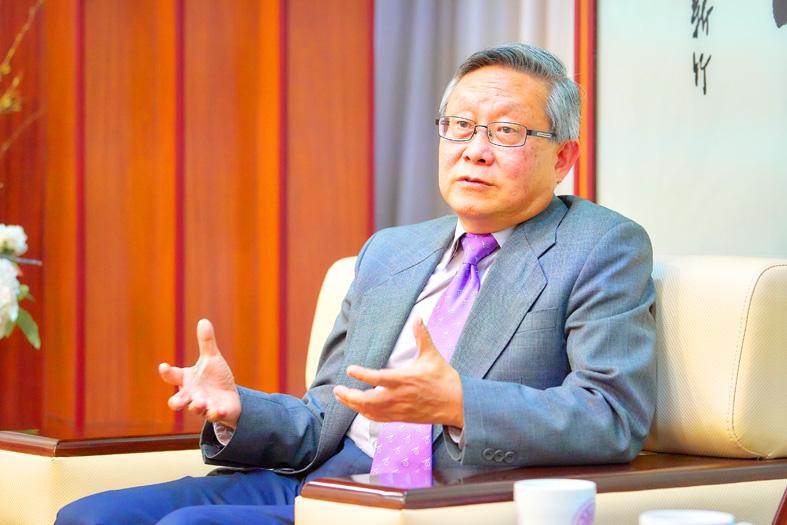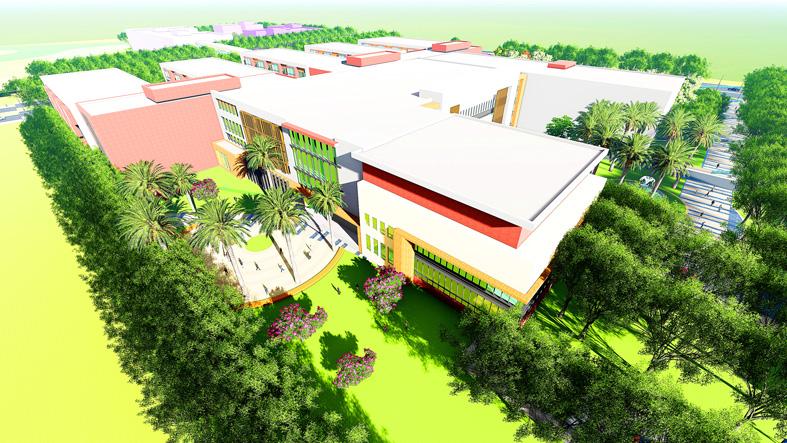National Tsing Hua University (NTHU) is heading into a new “era of medicine” and looking to bring Taiwan’s medical prowess to the world with a new medical department and hospital.
NTHU is to welcome its first class of medical students in August. A plan to build its own hospital was also approved by the Ministry of Health and Welfare’s Medical Review Committee on March 14.
The Ministry of Education in September last year approved NTHU’s proposal to establish a Department of Post-baccalaureate Medicine, which is now recruiting 23 government-financed students for the fall semester.

Photo: Hung Mei-hsiu, Taipei Times
NTHU president Hocheng Hong (賀陳弘) said in an interview with the Taipei Times on March 24 that the program aims to enroll and nurture doctors for the new era, who would be well-versed in technology or their own specialties other than medicine, are more determined than most high-school graduates to become doctors, and are passionate about serving remote communities.
The students will learn and receive internship training at Tsing Hua hospital, and another one or two well-established hospitals. The new Tsing Hua hospital is to be constructed under a build-operate-transfer (BOT) contract and is expected to commence operations in 2027, he said.
NTHU will invite bids from private hospitals next month and will negotiate with potential partners on the most ideal cooperation model before sending the operational plan to the health ministry for review, he added.

Photo courtesy of National Tsing Hua University
“The hospital that works with us can take advantage of NTHU’s outstanding teaching and research abilities to expand its conglomerate. For example, it can collaborate with NTHU’s professors in various departments,” he said.
The hospital is to be located in the Taoyuan Aerotropolis, providing the much-needed medical resources around Taoyuan’s Lujhu (蘆竹), Dayuan (大園), Guanyin (觀音) and Sinwu (新屋) districts, he added.
At the core of NTHU’s “era of medicine” is the vision to combine medicine with state-of-the-art technologies in the “ABC” field — artificial intelligence, big data and cloud storage — a trend widely seen around the world, Hocheng said.
He added that he believed that “in the future, medicine will not be medicine without ABC.”
Hocheng said he hoped to bring NTHU’s strengths in material science, mechanics, chemistry, nuclear medicine and brain science, together with developments in ABC, to create a cross-disciplinary, smart hospital.
“There is plenty of room at the bottom,” Hocheng said, quoting US Nobel laureate in physics Richard Feynman to elaborate on his vision for the hospital.
The president interpreted the bottom from two angles — from the grassroots and southbound.
The hospital would be a decentralized hub that connects the experiences of all doctors and assists grassroots doctors, whose lack of experience in the beginning can be compensated for with the help of ABC technologies, he said.
“Grassroots healthcare will no longer be lonely,” because doctors can refer to past cases stored in the cloud when there are no other experienced doctors around to help, Hocheng said, adding that these doctors can be connected to the world and feel supported.
In comparison to huge medical centers already equipped with more human and material resources, the benefits grassroots healthcare institutions can get from advanced technologies are more prominent, he added.
As there is a lack of channel for exporting Taiwan’s excellent medical capabilities, the hospital could be a starting point to bring Taiwan’s advanced medical technologies to the global stage, beginning with Southeast Asia, he said.
The convenient location of the hospital, only 400m from the Airport MRT’s A16 Hengshan (橫山) Station and two stops from Taiwan Taoyuan International Airport and the Taoyuan high-speed rail station, means that it is readily accessible for international patients seeking medical care in Taiwan, Hocheng said.
NTHU has already helped treat more than 200 cancer patients from Australia, Brazil, Japan, Singapore, Spain and other countries with its world-leading Boron Neutron Capture Therapy, which was developed using Taiwan’s only reactor for research use, he said.
Tsing Hua hospital will seek more opportunities to collaborate with cities in Southeast Asia to provide better treatment for patients without necessarily flying them to Taiwan, which is the most common practice in Taiwan’s hospitals at present, he said.
The hospital plans to set up remote medical bases in places like Jakarta, New Delhi, Mumbai and Yangon, offering advice to local medical institutions remotely from Taiwan, he added.
The choice of locations is to be finalized depending on the needs, population and technical abilities, among other factors, of the target cities, he said.
Hocheng said he also hoped to establish links with Europe and the US, saying the US’ west coast, where there is a sizeable Chinese-speaking population, would be a good candidate.
Developing international medicine can also reduce the hospital’s financial reliance on the National Health Insurance and out-of-pocket spending from patients, he said.
The hospital hopes to generate 10 percent of its revenue from international medicine, which should translate into more autonomy and freedom in its operation, he said.
It could help improve its technology and provide services to patients who might not be able to afford expensive treatments, he added.

Taiwan is stepping up plans to create self-sufficient supply chains for combat drones and increase foreign orders from the US to counter China’s numerical superiority, a defense official said on Saturday. Commenting on condition of anonymity, the official said the nation’s armed forces are in agreement with US Admiral Samuel Paparo’s assessment that Taiwan’s military must be prepared to turn the nation’s waters into a “hellscape” for the Chinese People’s Liberation Army (PLA). Paparo, the commander of the US Indo-Pacific Command, reiterated the concept during a Congressional hearing in Washington on Wednesday. He first coined the term in a security conference last

DEFENSE: The National Security Bureau promised to expand communication and intelligence cooperation with global partners and enhance its strategic analytical skills China has not only increased military exercises and “gray zone” tactics against Taiwan this year, but also continues to recruit military personnel for espionage, the National Security Bureau (NSB) said yesterday in a report to the Legislative Yuan. The bureau submitted the report ahead of NSB Director-General Tsai Ming-yen’s (蔡明彥) appearance before the Foreign and National Defense Committee today. Last year, the Chinese People’s Liberation Army (PLA) conducted “Joint Sword-2024A and B” military exercises targeting Taiwan and carried out 40 combat readiness patrols, the bureau said. In addition, Chinese military aircraft entered Taiwan’s airspace 3,070 times last year, up about

A magnitude 4.3 earthquake struck eastern Taiwan's Hualien County at 8:31am today, according to the Central Weather Administration (CWA). The epicenter of the temblor was located in Hualien County, about 70.3 kilometers south southwest of Hualien County Hall, at a depth of 23.2km, according to the administration. There were no immediate reports of damage resulting from the quake. The earthquake's intensity, which gauges the actual effect of a temblor, was highest in Taitung County, where it measured 3 on Taiwan's 7-tier intensity scale. The quake also measured an intensity of 2 in Hualien and Nantou counties, the CWA said.

The Overseas Community Affairs Council (OCAC) yesterday announced a fundraising campaign to support survivors of the magnitude 7.7 earthquake that struck Myanmar on March 28, with two prayer events scheduled in Taipei and Taichung later this week. “While initial rescue operations have concluded [in Myanmar], many survivors are now facing increasingly difficult living conditions,” OCAC Minister Hsu Chia-ching (徐佳青) told a news conference in Taipei. The fundraising campaign, which runs through May 31, is focused on supporting the reconstruction of damaged overseas compatriot schools, assisting students from Myanmar in Taiwan, and providing essential items, such as drinking water, food and medical supplies,